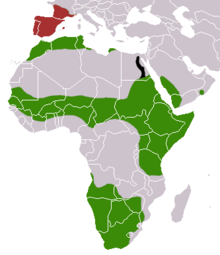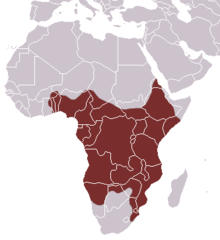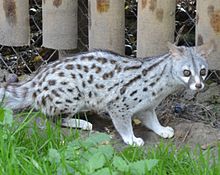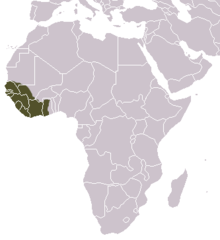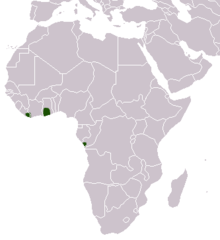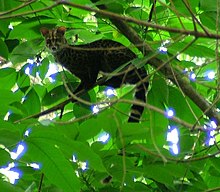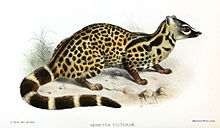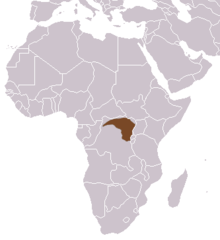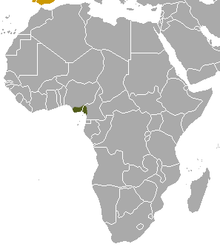ジェネット属
表示
(ジェネットから転送)
| ジェネット属 | |||||||||||||||||||||||||||
|---|---|---|---|---|---|---|---|---|---|---|---|---|---|---|---|---|---|---|---|---|---|---|---|---|---|---|---|

| |||||||||||||||||||||||||||
| 地質時代 | |||||||||||||||||||||||||||
| 鮮新世 - 現代 | |||||||||||||||||||||||||||
| 分類 | |||||||||||||||||||||||||||
| |||||||||||||||||||||||||||
| 和名 | |||||||||||||||||||||||||||
| ジェネット属[1] | |||||||||||||||||||||||||||
| 英名 | |||||||||||||||||||||||||||
| Genet |
ジェネット属(Genetta)は食肉目ジャコウネコ科の属。アフリカに17種が分布する[2][3]。ヨーロッパジェネットのみ南ヨーロッパにも分布する[4]。
ジェネット属の化石は中新世後期以降にエチオピア、ケニア、モロッコから見つかる[5][6]。
分類
[編集]学名 Genetta はフレデリック・キュヴィエによって1816年に命名 [7]。種の数には議論がある。以下の種は2005年に認められたものである[2]。(和名は川田ほか(2018)[1]による。)
絶滅種
[編集]†Genetta plesictoides – 後期更新世のキプロス[38]
進化史
[編集]ジェネット属(Genetta) とアフリカリンサン属(Poiana)は9.5-13.3myaに分岐したと算出される[39]。ジェネット属内では8.5myaまでにジェネットモドキ (Genetta thierryi)がまず分岐し、その後3.98-6.01myaにジャイアントジェネット (Genetta victoriae)が分岐したと考えられる[40]。
脚注
[編集]- ^ a b 川田伸一郎・岩佐真宏・福井大・新宅勇太・天野雅男・下稲葉さやか・樽創・姉崎智子・横畑泰志 「世界哺乳類標準和名目録」『哺乳類科学』第58巻 別冊、日本哺乳類学会、2018年、1-53頁。
- ^ a b Gaubert, P.; Taylor, P. J. & Veron, G. (2005). “Integrative taxonomy and phylogenetic systematics of the genets (Carnivora, Viverridae, Genetta): a new classification of the most speciose carnivoran genus in Africa”. In Huber, B. A.; Sinclair, B. J. & Lampe, K.-H.. African Biodiversity: Molecules, Organisms, Ecosystems. Proceedings of the 5th International Symposium of Tropical Biology, Museum König, Bonn. Springer. pp. 371–383
- ^ Wozencraft, W.C. (2005). "Genetta". In Wilson, D.E.; Reeder, D.M (eds.). Mammal Species of the World: A Taxonomic and Geographic Reference (3rd ed.). Johns Hopkins University Press. pp. 554–557. ISBN 978-0-8018-8221-0. OCLC 62265494。
- ^ Larivière, S.; Calzada, J. (2001). “Genetta genetta”. Mammalian Species 680: 1–2. doi:10.1644/1545-1410(2001)680<0001:gg>2.0.co;2. オリジナルの2016-03-03時点におけるアーカイブ。 2012年12月30日閲覧。.
- ^ Ginsburg, L. (1977). “Les carnivores du Miocène de Beni Mellal (Maroc)” (フランス語). Géologie Méditerranéenne 4 (3): 225–239. doi:10.3406/geolm.1977.1005.
- ^ Werdelin, L.; Peigné, S. (2010). “Carnivora”. Cenozoic Mammals of Africa. Berkeley, California: University of California Press. pp. 603–657. ISBN 9780520257214
- ^ Cuvier, F. (1816). Cuvier, G.. ed. Le règne animal distribué d'après son organisation, pour servir de base à l'histoire naturelle des animaux et d'introduction à l'anatomie comparée. I. Paris: Deterville
- ^ Linnaeus, C. (1758). “Viverra genetta”. Systema naturæ per regna tria naturæ, secundum classes, ordines, genera, species, cum characteribus, differentiis, synonymis, locis 1 (10th ed.). Stockholm: Laurentius Salvius
- ^ Gaubert, P.; Carvalho, F.; Camps, D. & Do Linh San, E. (2015). “Genetta genetta”. IUCN Red List of Threatened Species 2015: e.T41698A45218636.
- ^ Schreber, J. C. D. (1778). “Die Bisamkaze Viverra tigrina”. Die Säugethiere in Abbildungen nach der Natur mit Beschreibungen. Dritter Theil. Erlangen: Walther. pp. 425–426
- ^ Gaubert, P. & Do Linh San, E. (2015). “Genetta tigrina”. IUCN Red List of Threatened Species 2015: e.T41702A45219459.
- ^ Thunberg, C. P. (1811). “Beskrifning och teckning pa Viverra felina”. Kungliga Swenska Wetenskaps Academiens Handlingar: 165–168.
- ^ Gray, J. E. (1828). “Viverra maculata”. Spicilegia zoologica : original figures and short systematic descriptions of new and unfigured animals. London: Treuttel, Wurtz & Co.. p. 9
- ^ Angelici, F.M.; Gaubert, P. & Do Linh San, E. (2016). “Genetta maculata”. IUCN Red List of Threatened Species 2016: e.T41699A45218948.
- ^ Geoffroy Saint-Hilaire, I. (1832). “Descriptions d'une nouvelle espèce du genre Genette. Genetta. Cuv.”. Études Zoologiques : Ouvrage comprenant l'histoire et la description d'un grand nombre d'animaux récemment découverts et des observations nouvelles sur plusieurs genres déjà connus. Paris: Lequien Fils. p. 73
- ^ Gaubert, P. & Do Linh San, E. (2016). “Genetta pardina”. IUCN Red List of Threatened Species 2016: e.T136437A45221360.
- ^ Rüppell, E. (1835). “Viverra abyssinica. Rüppell”. Neue Wirbelthiere zu der Fauna von Abyssinien gehörig. Frankfurt: Siegmund Schmerber
- ^ Gaubert, P.; Duckworth, J.W. & Do Linh San, E. (2016). “Genetta abyssinica”. IUCN Red List of Threatened Species 2016: e.T8994A45198149.
- ^ Waterhouse, G. R. (1838). “On some New Species of Mammalia from Fernando Po”. Proceedings of the Zoological Society of London: 57–61.
- ^ Gaubert, P. & Do Linh San, E. (2015). “Genetta poensis”. IUCN Red List of Threatened Species 2015: e.T136435A45221269.
- ^ Pucheran, J. (1855). “Genetta servalina”. Revue et magasin de zoologie pure et appliquée. II 7 (Mars): 154.
- ^ Gaubert, P.; De Luca, D.W.; Rovero, F. & Do Linh San, E. (2016). “Genetta servalina”. IUCN Red List of Threatened Species 2016: e.T41700A97163789 30 October 2018閲覧。.
- ^ Bocage, J. V. B. (1882). “Liste de mammifères envoyés de Caconda Angola”. Jornal de Sciências, Mathemáticas, Physicas e Naturaes de Lisboa. 1 9 (33): 25–29.
- ^ Gaubert, P.; Fischer, C.; Hausser, Y. & Do Linh San, E. (2016). “Genetta angolensis”. IUCN Red List of Threatened Species 2016: e.T41696A45218468.
- ^ Thomas, O. (1901). “On the more notable Mammals obtained by Sir Harry Johnston in the Uganda Protectorate”. Proceedings of the Zoological Society of London II: 85–90. doi:10.1111/j.1469-7998.1901.tb08165.x.
- ^ Gaubert, P.; Dinets, V. & Do Linh San, E. (2016). “Genetta victoriae”. IUCN Red List of Threatened Species 2016: e.T41703A45219531.
- ^ Matschie, P. (1902). “Über die individuellen und geographischen Abänderungen der Ginsterkatzen”. Verhandlungen des V. Internationalen Zoologen-Congresses zu Berlin, 12.–16. August 1901. Jena: Gustav Fischer. pp. 1128–1145
- ^ Gaubert, P. & Do Linh San, E. (2015). “Genetta thierryi”. IUCN Red List of Threatened Species 2015: e.T41701A45219325.
- ^ Thomas, O. & Schwann, H. (1906). “The Rudd Exploration of South Africa.—IV. List of Mammals obtained by Mr. Grant at Knysna”. Proceedings of the Zoological Society of London 76 (1–2): 159–168. doi:10.1111/j.1469-7998.1906.tb08427.x.
- ^ Pocock, R. I. (1907). “Report upon a small collection of Mammalia brought from Liberia by Mr Leonard Leighton”. Proceedings of the Zoological Society of London 77 (May to December): 1037–1047. doi:10.1111/j.1469-7998.1907.tb06966.x.
- ^ Gaubert, P. & Do Linh San, E. (2016). “Genetta johnstoni”. IUCN Red List of Threatened Species 2016: e.T8997A45198265.
- ^ Allen, J. A. (1919). “Preliminary notes on African carnivora”. Journal of Mammalogy 1 (1): 23–31. doi:10.2307/1373716. JSTOR 1373716.
- ^ Gaubert, P. & Do Linh San, E. (2015). “Genetta piscivora”. IUCN Red List of Threatened Species 2015: e.T15628A45201673.
- ^ Hayman, R. W. (1940). “The Mammals of the North Gameroons Forest Area. Being the Results of the Percy Sladen Expedition to the Mamfe Division of the British Cameroons”. In Sanderson, I. T.. The Transactions of the Zoological Society of London. 24. pp. 623–726
- ^ Gaubert, P.; Angelici, F.M. & Do Linh San, E. (2015). “Genetta cristata”. IUCN Red List of Threatened Species 2015: e.T8998A45198406.
- ^ Crawford-Cabral, J. (1970). “As genetas da Africa Central”. Boletim do Instituto de Investigação Científica de Angola 7: 3–23.
- ^ Gaubert, P. (2003). “Description of a new species of genet (Carnivora; Viverridae; genus Genetta) and taxonomic revision of forest forms related to the Large-spotted Genet complex”. Mammalia 67 (1): 85–108. doi:10.1515/mamm.2003.67.1.85.
- ^ Theodorou, G.E.; Roussiakis, S.I.; Athanassiou, A.; Giaourtsakis, I.; Panayides, I. (2007). “A Late Pleistocene endemic genet (Carnivora, Viverridae) from Aghia Napa, Cyprus.”. Bulletin of the Geological Society of Greece 40: 201–208. doi:10.12681/bgsg.16514.
- ^ Gaubert, P. & Veron, G. (2003). “Exhaustive sample set among Viverridae reveals the sister-group of felids: the linsangs as a case of extreme morphological convergence within Feliformia”. Proceedings of the Royal Society of London B: Biological Sciences 270 (1532): 2523–2530. doi:10.1098/rspb.2003.2521. PMC 1691530. PMID 14667345.
- ^ Gaubert, P.; Fernandes, C. A.; Bruford, M. W. & Veron, G. (2004). “Genets (Carnivora, Viverridae) in Africa: an evolutionary synthesis based on cytochrome b sequences and morphological characters”. Biological Journal of the Linnean Society 81 (4): 589–610. doi:10.1111/j.1095-8312.2004.00309.x.


